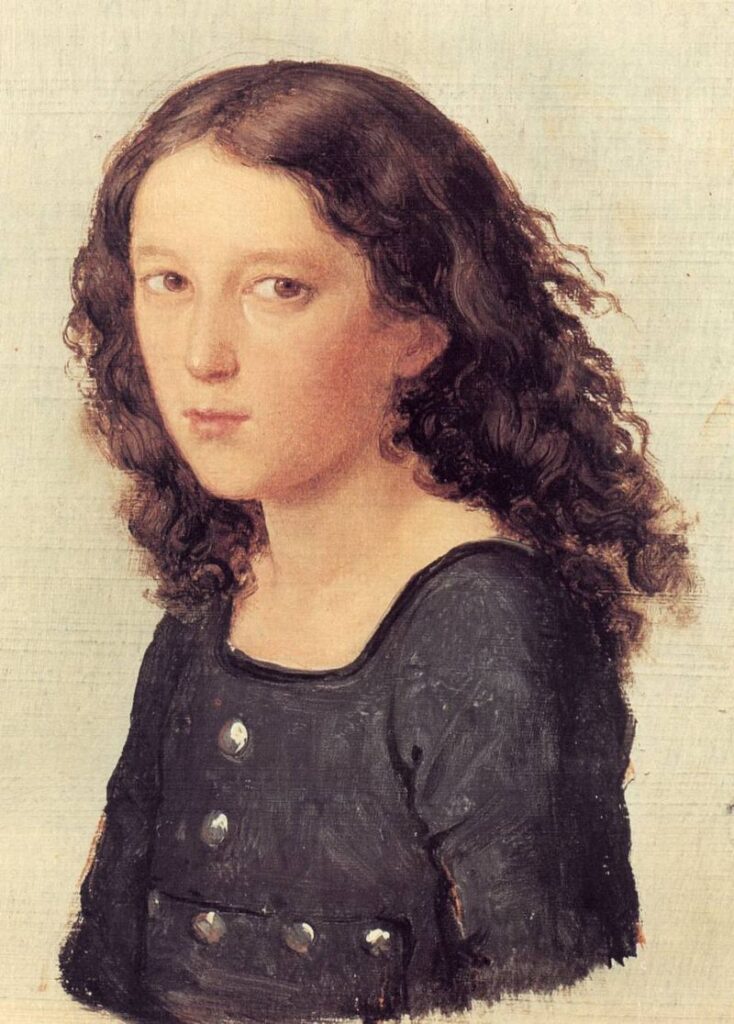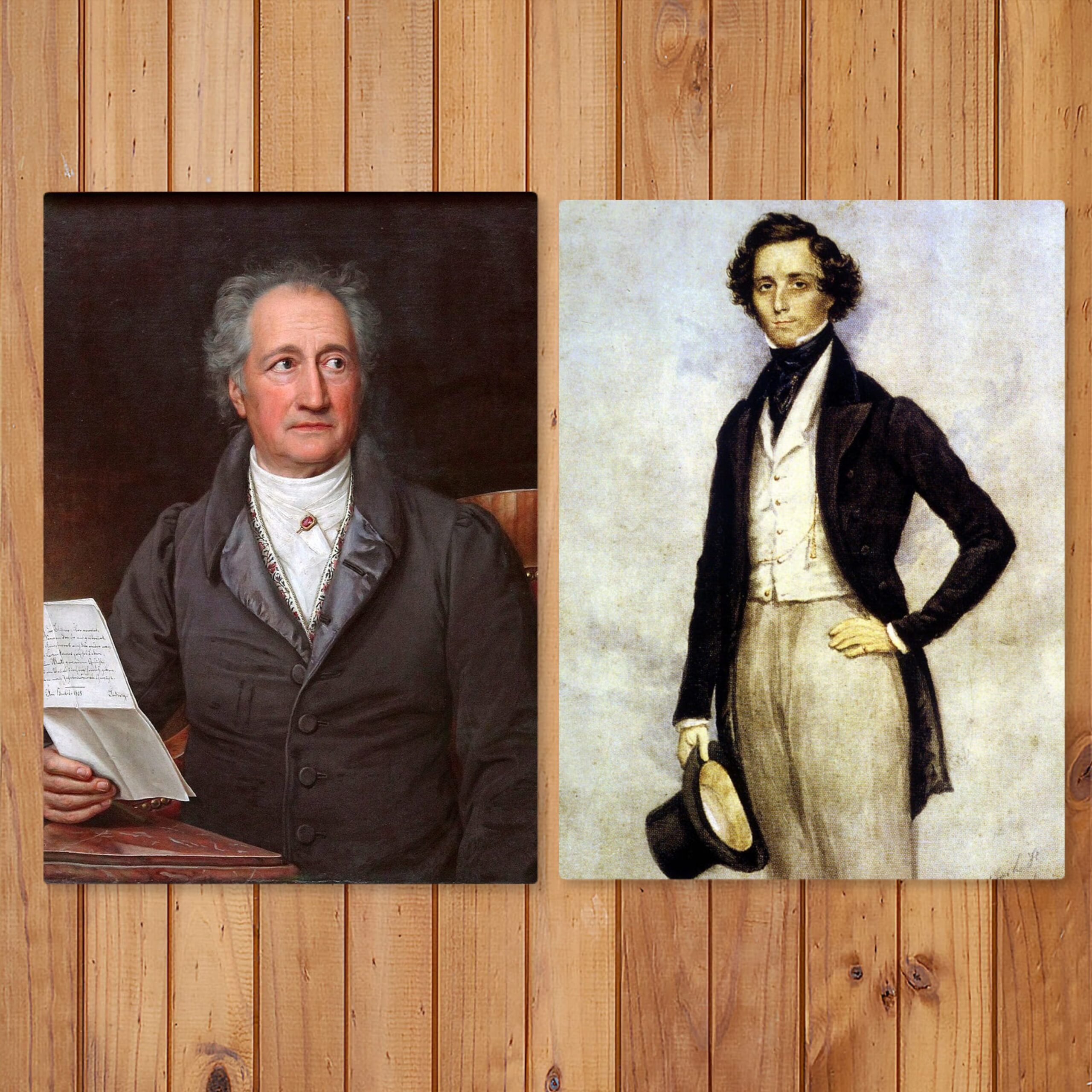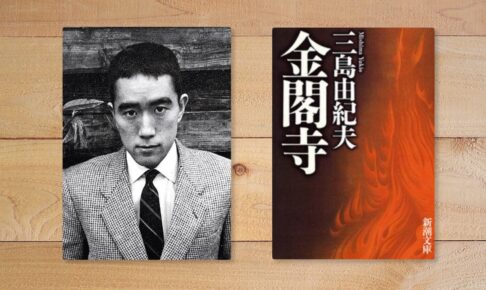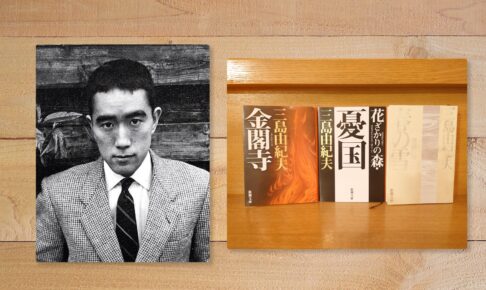Table of Contents
- 1 Mendelssohn and Goethe's connection and friendship - Mendelssohn was strongly influenced by "Travels in Italy
- 1.1 Mendelssohn and Goethe's first meeting - 1821, the year Mendelssohn was 12 and Goethe 72.
- 1.2 Fourth visit to the Goethe residence in 1830. And a final farewell.
- 1.3 Mendelssohn and Goethe's Travels in Italy
- 1.4 The "birth pains" of genius: The pride of an artist in the poetry of the young Mendelssohn.
Mendelssohn and Goethe's connection and friendship - Mendelssohn was strongly influenced by "Travels in Italy
German composer Mendelssohn (1809-1847) was a child prodigy from an early age.
The Mendelssohn family was of good family background, and its high cultural standards attracted a distinguished lineup to the Mendelssohn family salon. Mendelssohn grew up amidst the highest level of intellectuals of the time, including Humboldt, the linguist who founded the University of Berlin, philosophers Hegel and Gans, the Brothers Grimm, famous for their Grimm fairy tales, and writer Hoffman. When I learned this, I couldn't help but exclaim in surprise.
It's all connected, he said.
Great people who later leave their mark on history are always connected to each other somewhere. But this is indeed too much of a connection! Moreover, later on, he was also connected with that Goethe by a firm friendship. I was indeed stunned by this.
I became acquainted with Mendelssohn's life through his biography.
This article will introduce such a connection between Mendelssohn and Goethe.
The reference is "Mendelssohn: A Beautiful but Harsh Life" by Madoka Hino.
The following book, "The Mendelssohn Family: Three Generations of Jews," by Kupferberg, is the most detailed book on Mendelssohn's life, but for the sake of readability and familiarity, I will quote from Madoka Hino's work.
We recommend the following explanatory video about Mendelssohn, which is very easy to understand. Please watch it to learn more about Mendelssohn before reading this article.
Mendelssohn and Goethe's first meeting - 1821, the year Mendelssohn was 12 and Goethe 72.
On October 27, the twelve-year-old Felix left Berlin with his teacher Zelter and his teacher's daughter, and a week later, on November 3, he arrived in Weimar, the capital of the Duchy of Saxony-Weimar, where Goethe lived.
Goethe's house, considered by Goethe's admirers to be a "temple," stood facing Frauenplatz in the center of town.
Goethe had not yet returned from his trip, but the house was managed by Mrs. Ottelier, wife of Goethe's son, and the group was given a room for guests.
The large mansion had more than a dozen magnificent rooms, including a luxurious living room, reception room, and library.
Three days later, while Felix was sketching in town, Zelter came rushing to call him.
Goethe has arrived. He can stay here now."
When he first saw Goethe, Felix thought.
I had heard that he was seventy-two years old, but he is very young! And she doesn't look like any of the portraits.
Goethe greeted the boy with long curly hair and a face as lovely as an angel's in a friendly manner, but he still seemed doubtful that he was the prodigy his best friend boasted he was.
Sensing this, Zelter took Felix to the piano and ordered.
Play something for His Excellency."
Felix's Bach fugues and improvisations took Goethe's eyes, ears, and heart.
-Makoto, Mozart strikes again!
From this moment on, Goethe loved the boy, and his love for him grew every moment of every day.
Felix was not only a musical prodigy, but also excelled in languages and drawing, and yet he was a truly charming child with many elements that made him lively, innocent, and impossible not to love, unlike his study-obsessed pale self.
Goethe did not want to let the boy leave his person.
In a letter dated November 10, Felix reported to his parents.
'I play much more here than I do at home. I rarely play less than four hours, sometimes six, sometimes eight. Every afternoon Goethe would open Streicher's piano. I haven't heard you play at all today. I would like you to play a little for me," he said, and sat down next to me. And when I finish playing, he kisses me or Poku begs for a kiss. You can't imagine how nice and kind Goethe is to me.
Goethe was so enchanted by everything about Felix that he did not want to leave when the day of his scheduled departure arrived. A beautiful girl who was a relative of his was also staying at Goethe's mansion, and Felix was adored by her as well, which gave him a sweet childhood feeling.
He ended up staying at the Goethe residence for sixteen days.
When it came time to say goodbye, Goethe gave me many souvenirs. Among them was a poem with shadow puppets that he had written for Felix.
If the magician's broomstick can fly over the solemn score, you can straddle it too! Let me go on and on and on and on and on and on and on and on and on and on and on and on, and when I've done all I can do, come back here again.
This was a testament to Goethe's sincere admiration for Felix's improvisation.
Seventy-two year old Goethe and twelve year old Felix were united in a friendship that transcended their age difference.
Librio Press, Hino Madoka, "Mendelssohn: A Beautiful but Severe Life," p. 27-29.
It's like a smiling exchange between a 12-year-old Mendelssohn and a 72-year-old Goethe that comes to life right before your eyes.

Incidentally, here is a portrait of Mendelssohn at age 12. You can tell from this picture that he was a ridiculously beautiful boy. And Goethe, too, was amazingly talented and cultured, with a lively and charming personality.
He is truly a prodigy.
Also, as mentioned in the text above, Mendelssohn was talented not only in music but also in painting.
I was taken aback by this collection of drawings. As you can imagine, the drawings he did as a child would not be of such high quality, but his versatility seems to be similar to Goethe's.
Mendelssohn visited Goethe again four years later, but we will skip that for now and introduce the scene of his fourth visit to Goethe.
Fourth visit to the Goethe residence in 1830. And a final farewell.
Mendelssohn made a grand trip to Scotland, England, in 1829, when he was 20 years old.
It was customary for the heirs of prominent families of the period to travel throughout Europe on what was known as the "Grand Tour". The purpose was to travel at a young age to gain experience and also to expand their personal network.
After returning from England, Mendelssohn stayed at his parents' home in Berlin before setting off for Italy. On his way there, he visited Goethe.
After leaving his father in Dessau to go back to Berlin, Felix went to Weimar to visit Goethe. This was his fourth visit.
Eighty-year-old Goethe, who spent his days pouring his heart and soul into completing "Faust, Part II," welcomed Felix with open arms, and he,
We will be in Weimar for two days."
I told him that I was serious and stopped him.
I hope you won't miss anything by staying here a little longer, since you are about to embark on a journey that will last many years. I want you to come home every day for dinner and talk freely with me about Scotland, your upcoming trip, music, philosophy, poetry, and anything else."
No guest was so loved and so welcomed by Goethe, who is revered like a god by the intellectuals of Europe. Felix was told so by Mrs. Ottirier, the wife of Goethe's son, and felt the same way himself.
The emotional scars I had sustained in Berlin healed as I watched, and my mood cleared up instantly.
He went to Goethe's house every day, at Goethe's request, and spent hours at the piano, playing the great composers' pieces in chronological order and providing commentary.
Goethe was happy to listen to the music of Bach, Hendel, Mozart, and Felix,
Beethoven doesn't listen."
He refused to do so. Felix was the master on this occasion.
I can't help you with that. You have to know Beethoven. You can't leave it out. Listen to this. It is the first movement of the C minor symphony ("Fate").
Goethe was overwhelmed by Beethoven's music. When he finished listening to the music, he started mumbling and complaining, but eventually he revealed his true feelings.
This song is great! What power! Totally amazing! I am even afraid that this house will fall down. What would happen if this were played by a complete orchestra!"
Felix opened up a new world of music to Goethe.
Goethe even invited beautiful women to a ball for his beloved young friend. He even invited an artist to paint a portrait of Felix playing the piano. The stay in Weimar was extended several times at Goethe's request, but after two weeks, Felix was gone,
I have to go out soon."
When I started to cut him off, he finally gave up and allowed us to leave.
It was hard to say goodbye to an eighty-year-old and a twenty-one-year-old.
Goethe wrote a dedication address to the first edition of "Faust, Part I" and presented it to Felix.
My dearest young friend.F. M. B.To the powerful and gentle piano master - as a reminder of the days of May 1830.J.-W.Von Goethe."
Felix asked him on the spot to let him put music to "Valpurgis Night" in the book, much to Goethe's delight.
For Felix, who will now travel south through Germany, through Austria, and on to Italy, Goethe's "Travels in Italy," in which he describes his experiences on a trip to Italy at the end of his thirties, was the perfect road map.
Librio Press, Hino Madoka, Mendelssohn: A Beautiful but Severe Life, p. 97-9.
Goethe died two years later in 1832. So this was Mendelssohn and Goethe's parting of the ways.
And the "Travels in Italy" at the end of this quote. This is of great significance to Mendelssohn.
The Travels in Italy," previously mentioned in this blog, was published in 1816 and had an enormous impact on European intellectuals. Mendelssohn was one of them.
After parting with Goethe, Mendelssohn went to Italy. He took this "Travels in Italy" with him as his traveling companion.
Mendelssohn and Goethe's Travels in Italy
Mendelssohn had a strong admiration for Italy as Goethe saw it. And this influence is evident in the letters he sent to his family. His writing style was clearly inspired by Goethe's "Travels in Italy.
Mendelssohn and this "Travels in Italy" by Hiromi HoshinoMendelssohn's Scottish Symphony.In the following paragraphs, it was written as follows.
In the previous section, we emphasized that Mendelssohn's Grand Tour was meant as a "musical culture tour" or a job search. However, it should not be overlooked that there was another aspect to Mendelssohn's Grand Tour. In other words, it was an educational trip, which was common among European citizens at that time. In particular, Scotland, where Mendelssohn went for a summer vacation, and Italy, where he stayed the longest during his Grand Tour, were popular places for culture tours, and Mendelssohn also gained a wide range of experiences there, not limited to music.
The aspect of the trip as a teaching trip has been pointed out exclusively in previous studies of Mendelssohn's travels in Italy. Miller's analysis of Mendelssohn's letters during his travels in Italy from the standpoint of a literary scholar is particularly illuminating. Let us summarize his argument. In his letters from Italy, Mendelssohn writes as if he were narrating his own experiences, making "I" a character in a novel, so to speak. This is especially true of his letters to his family. (In his letters to his family, Mendelssohn writes as if he were telling the story of his own experiences.)
On the other hand, in Mendelssohn's letters from Italy, one can read the overwhelming spiritual influence of Goethe Johann Wolfgang von Goethe (1749~1832). This is felt not in the style of writing, but in the overall mood, thought, and language of the letters. In the sections where he directly quotes Goethe's "Travels in Italy" (published in 1816), and even when he does not, Mendelssohn consciously or unconsciously uses it as a guide when reporting his experiences during his travels. In other words, before he actually saw the Italian landscapes, ruins, architecture, and works of art, he had already acquired knowledge of the subject through Goethe, and even been given an interpretation of it. One could say, "He was actually living in Goethe's Italy during his stay in Italy, especially in Rome and Naples." This is. This was more or less the same tendency of all travelers who went to Italy during this period.
Ongaku no Tomo Sha, Hiromi Hoshino, Mendelssohn's Scotland, p. 65-6
He was actually living in Goethe's Italy during his stay in Italy, especially Rome and Naples."
You feel the tremendous power of Goethe's sensitizing power, don't you?
Although this meeting with Goethe was to be their last, Goethe remained a major presence in Mendelssohn's life.
The "birth pains" of genius: The pride of an artist in the poetry of the young Mendelssohn.
Back in time, Mendelssohn completed the overture to "A Summer Night's Dream" at the age of 17 with overwhelming success. This piece was inspired by Shakespeare's "A Summer Night's Dream," which he loved.
After the success of this piece, Mendelssohn continued the momentum with an opera titled "The Marriage of Camacho.
But this was an abject failure. The quality of the song itself was also a failure, but things are not that simple.
Berlin, where he was from, was a conservative city with strong Jewish discrimination.
Therefore, Mendelssohn, a young and talented sergeant of a large Jewish banking family, originally had many enemies, and they took this opportunity to criticize Mendelssohn harshly.
From this point on, I will quote from Mendelssohn's biography, "Biography of Mendelssohn: Three Generations of Jews.
Camacho was not the first and last severe criticism Mendelssohn received. Even at Sunday concerts, some people would find something to nitpick about, and sometimes their opinions were published in the newspapers. In a letter to Goethe, Zelter (Mendelssohn's musical teacher) complained about the Bärlin critics' treatment of Felix. They treat Felix's string quartets and symphonies coldly in the music press. ...... These gentlemen dirtbags ruthlessly devalue things that are far above their heads. It is appalling that they would judge an entire house by a single brick."
Tokyo Sogensha, H. Kupferberg and R. Yokomizo, The Mendelssohn Family: Three Generations of Jews, p. 179
And Mendelssohn takes the following action in response to these unfair criticisms. This is amazing..!
After reading a review about himself, Felix wrote a poem in response, expressing his feelings. He wrote the poem in the "Garden Newspaper" (a newspaper only in the Mendelssohn household, a kind of family record. It is a kind of family record. He did not try to spread the poem outside of the "Garden Newspaper" (a newspaper only for the Mendelssohn family, a kind of family record).
If an artist wrote solemnly
It's for a napIf the artist enjoyed writing
It's in bad taste.If the artist wrote at length.
Sorry to hear you have to listen to it for so long!
If the artist wrote short
take no notice ofIf the artist had simply written
They'll say he's a fool.
If the artist wrote intricately
He's crazy. I know it when I see it.No matter how much I write anyway.
You can't please everyone.
Then let the artist write
As you like, as you can
Tokyo Sogensha, H. Kupferberg and R. Yokomizo, The Mendelssohn Family: Three Generations of Jews, p. 179-180
How about this? This is the poem of a precocious genius, Mendelssohn, 17 years old.
At his age, he must have already felt the loneliness of genius.
I read this book a long time ago, but I still remember the impact of this poem.
Mendelssohn loved Shakespeare, and at the age of 16 he performed "A Summer Night's Dream" with his brothers and friends, from which he created the overture.
He was thoroughly gifted from an early age and has an outstanding education in literature.
The last line of the above poem is also possibly the work of ShakespeareAs You Like It."It may come from the
In any case, the above poem made me feel Mendelssohn's pride as an artist.
This kind of Mendelssohn is probably why Goethe loved him so much.
Goethe was also a solitary genius. His overly rich sensibilities were not understood by those around him, and there was a time when he himself felt distant from those around him.
Goethe also left many works, but their appearance in the world also meant that they were subjected to a great deal of criticism. He must have received a lot of unfair criticism and slander, just as Mendelssohn did.
And I am sure that you have also experienced the pain of not being able to produce good works, no matter how much you think about it.
I think it was because the two of them intuitively sensed these unique sufferings of genius that they were able to feel each other's pain.
That is how I felt about their relationship.
In fact, Mendelssohn and Jenny Lind, a Swedish diva, would later share a unique empathy for each other's genius. Please refer to the following book for more information on this subject.
Goethe and Mendelssohn.
I feel that the friendship between the two geniuses was deep beyond their age.
Indeed, both are all-around geniuses who transcend the breadth of literature and music.
It is romantic to imagine that there was something that only the two of them knew.
I love both Goethe and Mendelssohn.
Feeling that connection was a very happy time for me.
I hope this article has given you some idea of the appeal of Goethe and Mendelssohn.
The above is "Mendelssohn and Goethe's Exchange and Friendship - Mendelssohn was strongly influenced by "Travels in Italy".
Next Article.
Click here to read the previous article.
Related Articles







































